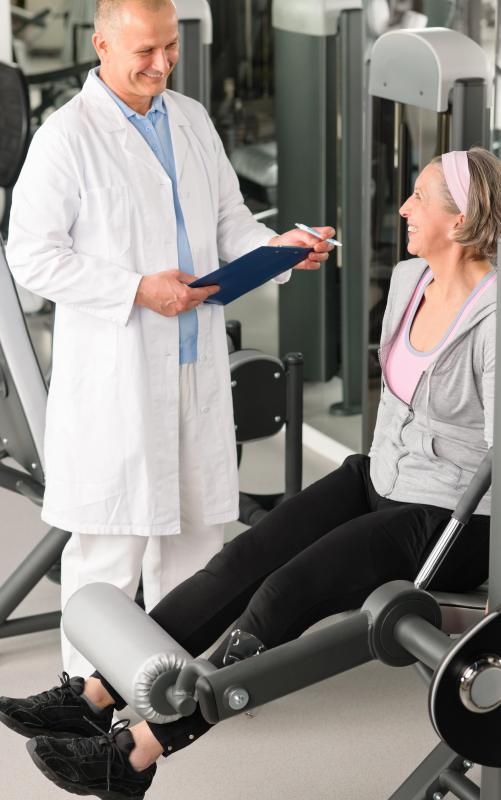At WiseGEEK, we're committed to delivering accurate, trustworthy information. Our expert-authored content is rigorously fact-checked and sourced from credible authorities. Discover how we uphold the highest standards in providing you with reliable knowledge.
What are the Symptoms of Quadriceps Tendinitis?
Quadriceps tendinitis is a condition in which the quadriceps tendon, a strong band of connective tissue that attaches the four heads of the quadriceps muscle to the knee, becomes inflamed. This can be the product of either an acute injury, such as a straining of the tendon caused by an explosive jumping movement, or of a gradual wearing down of the tissue from overuse, as in athletes who must perform repetitive running, jumping, or squatting movements. Symptoms of quadriceps tendinitis generally include pain, swelling, and stiffness just above the kneecap, which is where the quadriceps tendon attaches to the patella bone.
Originating on the ilium bone in the hip and along the front of the femur bone in the thigh, the four heads of the quadriceps include the rectus femoris, which is the most superficial, and beneath that the vastus medialis, vastus intermedius, and vastus lateralis. All four insert via the quadriceps tendon to the anterior or front surface of the patella. This tendon, which is a relatively inflexible band of fibrous tissue, transfers powerful forces from the quadriceps, the primary extensor of the knee joint, across the knee.

Due to the large load placed on this tendon, it may wear down and become irritated over time or become abruptly inflamed from a high-impact movement, particularly when the quadriceps is not strong enough to handle the forces acting on it. In the case of quadriceps tendinitis brought on gradually, it is typically caused by friction between the tendon and the kneecap, with the tendon becoming inflamed from repetitive rubbing over the bone. This continued friction creates tiny tears in the fibers of the tendon that never get a chance to heal, and if the activity causing the inflammation is not ceased, the tissue becomes increasingly weakened and at risk for a partial or full-blown tear.

Sudden trauma to the area can also lead to quadriceps tendinitis, common in athletes returning to training after a hiatus, whose quadriceps muscles may be weakened and unaccustomed to the demands of the training. For instance, when the quadriceps are contracted forcefully to extend the knee, such as when an athlete stands up quickly from a squat position or decelerates the landing of a jump, the quadriceps tendon, which does not stretch as the muscle does, may not be able to withstand the excessive force being transferred. This can lead to overstretched, inflamed tissue — quadriceps tendinitis — or a more severe injury such as a tear.

As quadriceps tendinitis presents with such specific symptoms, it is not considered difficult to diagnose. When moving the knee, the individual will experience pain from the tendon rubbing on the bone right on the upper border of the kneecap and often swelling in the area. He may also report a burning sensation where the muscle meets the knee as well as stiffness, most often during and after a workout, first thing in the morning, and at night. Finally, he will likely experience tenderness in the tissue above the kneecap when palpating or moving the knee joint.

To treat these symptoms, doctors recommend resting the area, avoiding exercise that works the knee joint for four to six weeks. This will allow the damage to the tendon to heal on its own. For the pain, over-the-counter anti-inflammatories such as ibuprofen can be taken, and the knee can be iced to reduce inflammation and swelling.
AS FEATURED ON:
AS FEATURED ON:

















Discussion Comments
It's really important to see a doctor if you suspect you have this problem. I delayed and debated and tried to treat myself. Then I fell while running, and the end result was a ruptured quadriceps tendon and surgery!
@Bakersdozen - I feel for you. I had a similar problem a couple of years ago, though mine turned out to be patella tendinitis.
Have you had ultrasound therapy at the hospital? I found it to be fantastic for pain relief, and I am sure it helped me get better quicker. Not so confident about you trying to do this at home though. People get trained up for that job, so perhaps best to let them do it with a powerful machine.
Last year I was diagnosed as having quadricep tendinitis, which is the result of a sports injury. It's proving near impossible for me to recover properly because I can't rest it as the doctor recommended.
Now I find the pain in my knee is almost constant, and despite icing, applying heat, acupuncture and attending physical therapy it just won't heal!
It almost feels like trying to get better is becoming a full time job, and I know I'm starting to lose the sympathy of friends and family as I can't think about anything else.
Someone mentioned buying a home ultrasound device, as this is said to help break down the scar tissue around the tendon. It is a bit expensive, but I'm so desperate I'd try pretty much anything.
Post your comments